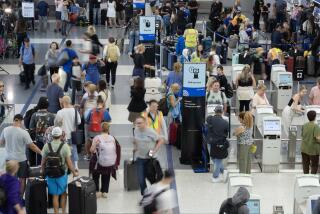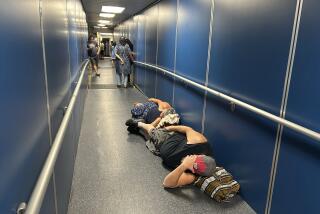When flight troubles loom, travel sites spread the word
- Share via
Chicago — THE image on the computer screen showed thousands of airplanes dancing an intricate ballet in the skies over the U.S., flying high and low, east to west, north to south and vice versa. Every airplane flying into or out of a U.S. airport was shown.
On alert for any ungraceful moments in the dance was former military air traffic controller Bill Partridge. He was sitting in a high-rise in downtown Chicago carefully monitoring the skies. Partridge is one of four former air traffic controllers who are part of a customer alert team for online travel agency Orbitz. If he spots trouble brewing, he records travel alert messages that are automatically sent by phone to Orbitz customers who might be affected.
I visited the Orbitz TLC Center on a quiet day in July. Air traffic was flowing smoothly around the country, and the weather -- which contributes to 70% of delays, Partridge said -- was cooperating. On any given day, as many as 3,000 people hear Partridge’s voice in recorded travel alerts.
On a busy day, the number can be much higher. When the alleged terror plot in Britain was revealed Aug. 10, Orbitz sent recorded messages to 17,000 customers flying that day. On that day, 120,000 more customers received automated notices of gate changes, weather and other delays. It also created a list of 230,000 customers flying over the next four days to notify them of changes in airport security policy.
Customer service initiatives by Orbitz and fellow online travel agencies Expedia and Travelocity are working to engender some customer loyalty from notoriously fickle online travel shoppers, said Henry Harteveldt, vice president and principal analyst for Forrester Research, of Cambridge, Mass.
A survey conducted by Forrester found that 26% of Expedia and 31% of Travelocity customers have also made purchases on Orbitz.
“Consumers view supplier sites operated by airlines, hotels, car rental agencies, cruise lines etc. [as] more trustworthy and more accurate,” he said. As a result, online travel agencies are looking for ways to compete other than on price, which is pretty much a wash across the sites.
“They all have the same airlines,” Harteveldt said. “Expedia has more hotels, but there’s not a lot of product differentiation.
“They won’t win on price against the supplier.”
Expedia launched a three-part customer service initiative in the last year that includes a best-price guarantee, a promise about what customers can expect from their dealings with Expedia and a guide that helps travelers plan their trip.
Travelocity monitors consumer feedback, and if something is not as it is represented on its site (construction next door to your hotel or a pool closed), it promises to notify the customer and offer alternatives. Its guarantee says it will help you during your entire trip, not just in the planning of it.
But in terms of proactively notifying customers of potential trouble with flights, Orbitz appears to be in the lead.
“Orbitz seems to get and interpret information faster and pushes information to customers more rapidly,” Harteveldt said.
At the heart of that effort is the former air traffic controller at the Orbitz TLC Center in Chicago. About a dozen work stations face several large, flat-screen monitors that display different types of graphic information on the status of U.S. air traffic. A television is tuned to a cable news station.
Partridge brought up some FAA weather information for Chicago’s O’Hare airport onto his computer screen. The information was written in some kind of shorthand decipherable only to those in the know.
I asked him about the display of planes dancing around a screen and how that information was made useful.
“Graphic information is more easily understood,” he said. For example, thunderstorms may be causing air traffic to be routed around them.
“I can see how other traffic might be affected,” he said.
Despite the general calm the day I was there, delays were still being reported. Customer service agent Cynthia Jones received a message that a customer’s flight from Dayton, Ohio, to Cleveland had been delayed, meaning the customer would miss her connection to Richmond, Va.
The call center handles different levels of customers. Regular Orbitz customers receive notification if trouble is brewing, but customers with Orbitz for Business and Travelport, both geared toward business travelers, get a higher level of service because their companies have contracts with Orbitz.
Because this customer was a Travelport customer, Jones was on the phone with the airlines trying to schedule another flight before the customer was even aware there was a problem.
Whether this type of hands-on service will pay off for the online travel agencies remains to be seen, Harteveldt said.
“If you can use service and customer care as a distinguishing element, you will, hopefully, reduce that volume of cross shopping,” he said.
*
Contact James Gilden at james.gilden@latimes.com.
More to Read
Inside the business of entertainment
The Wide Shot brings you news, analysis and insights on everything from streaming wars to production — and what it all means for the future.
You may occasionally receive promotional content from the Los Angeles Times.










